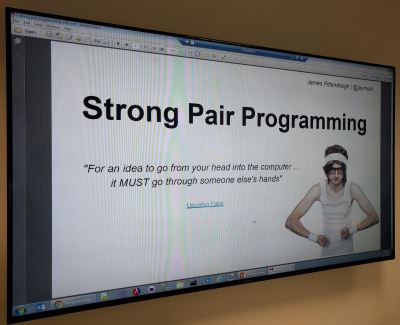
Strong Pair Programming - Wednesday 1st August 2018
Are you still doing that old weak pair programming style? Are you often sat there watching someone code, telling people that they have a typo, or that they have missed a semi colon?
At Leeds Code Dojo in August we tried our hands at STRONG pair programming, guided by LCD regular James Pittendreigh.
The key principle is:
- "For an idea to go from your head into the computer, it MUST go through someone else's hands"
We paired up and had a go at the Diamond Kata to give this method a good run. It's fair to say it met with limited success - some pairs thought it was an interesting thing to try, but many didn't really see the benefit and found it a bit awkward to do.
I don't think the kata we chose really helped, as it was quite difficult to arrive at a solution iteratively, so swapping pairs didn't happen as much as it could have.
You can see the kata and solutions on guthub, with the usual photos etc. on Meetup.
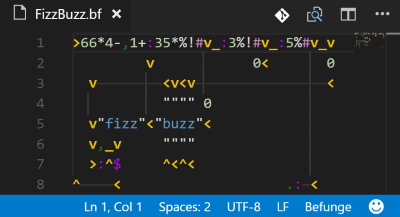
To Infinity and Befunge - Wednesday 6th June 2018
This month we looked at an 'Esoteric' programming language called Befunge where the code is written as instructions scattered across a 2D grid rather than in a traditional program.
Befunge programs are similar to Turing machines and we rolled up our sleeves to delve into this language, skillfully guided by Andy Bowes, by first writing interpreters for a cut-down Befunge instructions set then trying to solve a couple of problems using them.
It was a good session, the interpreter part was of a fair complexity but several people managed to get onto using Befunge. It's a very interesting and challenging language to use, certainly not something you can imagine wanting to write business apps in but could be quite handy for code golf!
You can see the materials and solutions on guthub, with the usual photos etc. on Meetup.
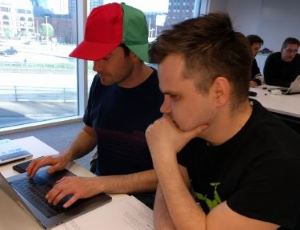
Farkle - Wednesday 2nd May 2018
This month we returned to the traditional TDD Kata format, using Test Driven Development and Pair Programming to implement a scorer for the dice game Farkle.
Usually we're pretty relaxed with how closely participants follow the rules of TDD, but this time we went extra-strict, even maintaining a Wall of Shame for those foolish enough to ignore Uncle Bob. James even brought along his hand-crafted TDD hat to help him remember the steps!
As if he'd forget..
There are some solutions and instruction on github, with the usual photos on Meetup.
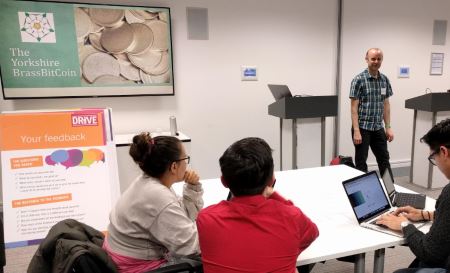
Mining for BrassBitCoin - Wednesday 7th March 2018
Everyone knows that Yorkshire has everything. However, it didn't have it's own currency. So it was time to put that right, as we built and mined our first Yorkshire cryptocurrency - the BrassBitCoin!
Utilising leading-edge Blockchain technology, LCD benefactor and cryptocurrency expert* Adam Pridmore guided us through the process of defining and then mining for our very own digital currency. (* Relatively speaking. I think he read an article on it once.)
And if that wasn't enough, we got to keep all of the priceless (or possibly worthless) coins mined!
This was a very interesting session, personally I feel much more up to speed with the basic concepts of cryptocurrencies having implemented a (very) basic version. But more importantly, will the BrassBitCoin catch on and make us all millionairs?! Given the lax validation of transactions I'm going to guess not, but maybe we can address these issues with BrassBitCoin v2 in a future session..
You can see the code and information on github, and some photos on Meetup.
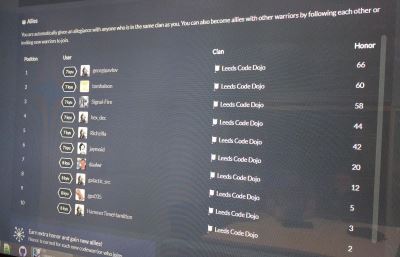
Code Wars - Wednesday 7th Feb 2018
This month we had a go at Codewars, a site which lets you pit yourself against yourself or others by completing increasingly harder coding challenges. All in a friendly, learning-oriented way of course!
Codewars is one of the new generation of coding challenge sites, making good use of social interaction and user-generated problems to provide a great learning/coding challenge experience. Using an online IDE supporting a large range of languages, you can increase your rank by solving a wide range of problems, and also gain honour by completing challenges, beta testing problems, and even writing your own kata to be used on the site.
Starting from scratch, the goal was simple - see who could be at the top of the leaderboard by the end of the night! There were a couple of leaders throughout the session, with team tomhalson leading for the most part, but team georgipavlov came through to take it at the last refresh!
There is nothing on GitHub this time, but you can still see the event on Meetup.
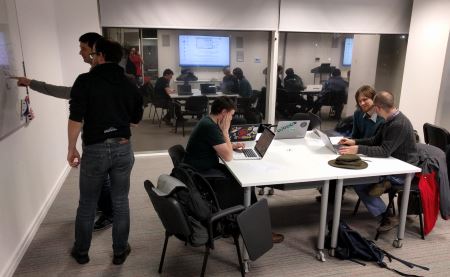
Coding Deathmatch: Static vs Dynamic - Wednesday 3rd Jan 2018
We kicked off 2018 with a good old-fashioned grudge match, pitting the safety and runtime speed of statically typed languages against the ease of writing and flexibility of dynamic ones.
Both statically typed (e.g. C, C#, Java) and dynamically typed (Lisp, Ruby, Python) languages have been around for a while, but until now it has not been clear which is the better language design. Does the compile-time safety net of static typing really reduce the number of bugs, or is the hassle of making all of your types line up time that could be better spent writing more awesome software? Is dynmically typed code really easier to write, or do you end up spending longer working out what 'x' is supposed to represent?
Using the language of their choice, coders were paired up and put into the dynamic or static group, to work on the Bowling Game Score problem. We had a few languages in use including Haskell, C#, Rust and JavaScript, and although we tried to even out the groups there were more people in the static language camp.
At the end of the session, we got the pairs to split up and mark each other's solutions using some predefined test cases. The results were very good, with most teams managing a perfect score. In the end it came down to just one or two failed test cases.. Ultimately, the result was:
Static Languages FTW!
The problem and some solutions are up on github, and you can see some photos of the night on Meetup.
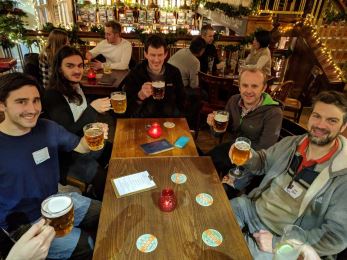
Christmas Coding - Wednesday 6th December 2017
To help people get ready for the festive season (assuming they weren't sick of it already), we had a go at some vaguely Christmassy programming problems from Advent of Code.
It turned out to be a good set of problems, starting off relatively simple but quickly ramping up. I think everyone managed to finish the first day's problems, and some managed to get onto the 5th and 6th!
As usual a number of languages were in use including Scala, C#, F#, Java, C++, JavaScript and APL. In a suprising turn of events, the person who got the furthest was using not some fancy pattern-matching asynchronous functional hipster language, but good old Excel and VBA!
It's not your tools, as they say, but how you use them..
Check out the photos on Meetup, and the usual selection of solutions on github.
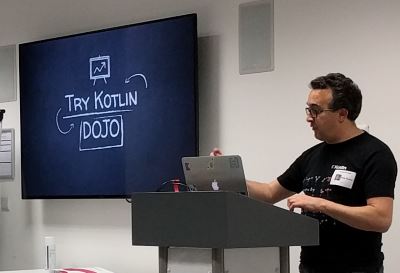
Try a Language: Kotlin - Wednesday 1st November 2017
This month, Andy Bowes introduced us to Kotlin, a programming language that provides a pragmatic combination of OOP & Functional Programming. As many members of LCD will testify, Andy has been raving about the language for the past 18 months. Kotlin has been rapidly gaining in popularity, especially since Google announced in May 2017 that Kotlin is an officially supported language for Android development.
This session allowed people to get hands-on with this new language to become familiar with it's features & idioms by working on some problems put together by Andy, from Hello World through FizzBuzz all the way to interacting with a complex REST web service.
There are a couple of photos on Meetup. The problems, cheat sheet, base solution and other info are on github.
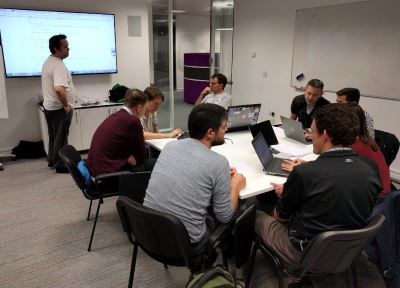
Get Cryptic - Wednesday 4th October 2017
In October we had a look at some Cryptography-based exercises from CryptoPals.com. We started off with the basics, writing code to convert between different binary formats such as Hex and base64, moving onto breaking simple ciphers.
Craig Norton Provided the expertise for the evening, despite it being his birthday, having worked through several of the exercises previously.
Despite being described as 'relatively easy' on the website, most participants found the first set of exercises fairly challenging, but I think most people got through one or two. There was a lot of bit-shifting, binary XOR, bit masking, and other shenanigans that I suspect most people hadn't used since school, but it was all good clean programming fun!
Photos are up on the Meetup page. Information, links and solutions can be found on github.
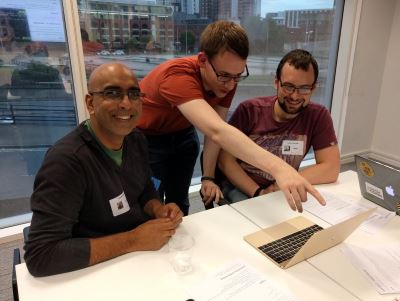
Try a Language: Rust - Wednesday 6th September 2017
This month, Adam Hodgen guided us through the Rust language, with some practical exercises designed to teach the basics of the language. In Adam's words:
Rust is a systems programming language developed by Mozilla. It is designed to be a "safe, concurrent, programming language", and aims to support multiple platforms, including Linux, Windows, and embedded systems. Rust's idea of safety is an extremely central aspect of the language, and influences all aspects of building systems with Rust. This is accomplished via a very powerful type and memory management system, which guarantees at compile time that your code is memory safe, and has no data races, null pointers, or use-after-free errors.
The group learned some of the basics of Rust, including data handling, concurrency, and data safety, by following a set of increasingly involved exercises put together by Adam. Most people got on fairly well, although I wouldn't say Rust is a particularly beginner-friendly language because there are quite a few concepts you need to understand to get going.
You can see the photos on the Meetup page, and the exercises are up on github.
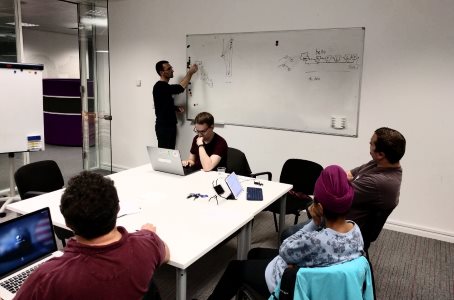
Regex Rumble - Wednesday 2nd August 2017
After the very specific (and somewhat scorned) method of the previous session, in August we went the other way with a very loosely-specified 'write the solution to an interesting problem' type coding exercise involving creating our own Regular Expression matchers.
After a brief introduction to Regular Expressions, the coders were left to their own devices to write their own regEx engines as they saw fit. Some hacked it, some added some tests, quite a few did TDD - I don't think anyone TDD'd As If They Meant It though..
A lot of different languages were used, and different approaches taken - some pairs went for the full state machine model, while others did a little at a time in a very iterative manner. As you might imagine nobody got near writing a complete engine, but a couple of people got surprisingly far in the time available. But most importantly, everyone had a good time writing some code!
You might be able to find some photos on the Meetup page, while some solutions and details are up on github.
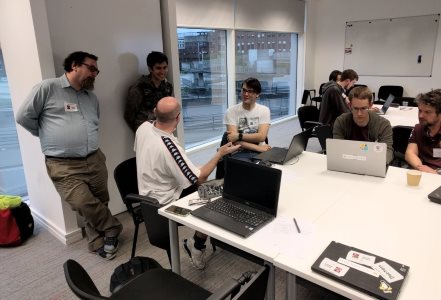
TDD As If You Meant It! - Wednesday 7th June 2017
Despite having proven back in April that Test Driven Development is inferior to plain old hacking, we went back to look at another TDD-based technique in this June's session. Maybe we just weren't using the right *kind* of TDD!
This time we tryed out 'TDD as if you meant it', a more advanced TDD process where you start with your code in the test and only migrate it out into methods and classes as needed. We tried this on writing TicTacToe scorers, which took a board of unspecified specification and decided who had won. But did this lead to a cleaner design, or just more frustration?
Well, let's just say I don't think many people will adopting TDD As If You Mean It as their usual development process. It didn't help that we didn't have any TDDAIYMI experts around, but it wasn't always clear how to apply them to our situations, and when we did it didn't seem to help much. The initial phase was quite different, although questionable about whether it was better, and at some point the code had migrated out of the tests and then it's basically normal TDD.
Check out some of the photos on meetup, and you can find some solutions on the github repo.
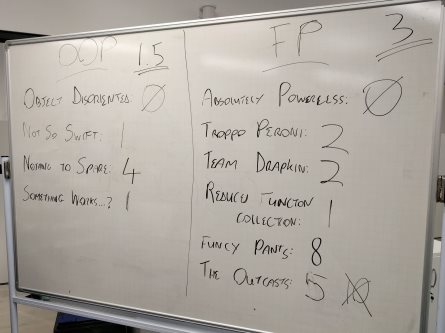
Coding Deathmatch: Functional vs OO - Tuesday 25th April 2017
Ever since we moved on from machine code, programmers have been looking for the next best abstraction to represent our systems. For a long time, objects seemed to fit the bill - conceptually simple, easy to work with, a good way to split up code. But with the move to increasingly server-based systems and the need for easy parallelisation, the functional style previously used only by beardy academics has stepped into the limelight.
So which is the better? Object Orientated or Functional? In this session, we found out!
Split into Functional Fans and Object-Oriented Aficionados, developers worked in pairs to create scoring programs for a game of 10-pin bowling, using some relatively harsh constraints for their functional or object oriented code. At the end we applied a sophisticated scoring algorithm, based on the test cases implemented and rules broken.
It was a relatively close battle, with several casualties (one team lost their solution due to misuse of an online IDE, another ran out of batteries shortly before the scoring), but in the end the functional programmers won it with a score of 3.0 to OO's 1.5! (It should be noted that this was out of 10, so from that point of view they both lost.. ;-)
Check out some of the photos on meetup, and you can find the problems and solutions on github.
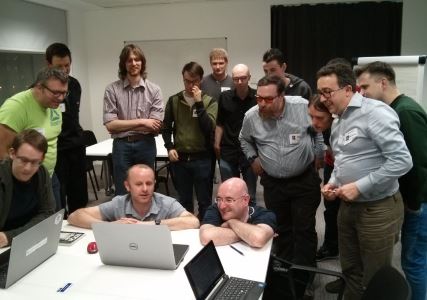
Coding Deathmatch: TDD vs Hacking - Wednesday 5th April 2017
Some people claim Test Driven Development is the best thing since Lisp, others think it's about as useful as Microsoft Silverlight - but who's right? In this fight to the blue screen of death, we found out once and for all!
Atendees were split you into roughly even groups of TDD proponents and TDD haters, and codes solutions to Roy Osherove's String Calculator using their preferred process (and language). The opposing factions split into pairs and coded away for about an hour and a half, based on strict rules for TDDers and Hackers - some penalty points were given, but by and large they were followed. Some of the hackers got bonus points for finishing early, and most of them chose the gamble of not running their programs at all until the big reveal at the end!
The gamble paid off for the hacking teams, whose solutions all worked first time, with only minor defects. After this points boost, the only hope for the TDDers was to get more points for the maintainability of their code, but in the end the hackers won by quite a margin.
So, it has been decided - no more TDD!
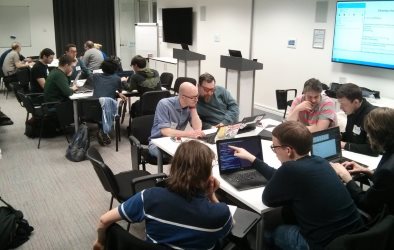
Gilded Rose Refactoring Challenge - Wednesday 1st March 2017
in March we got into some good old-fasioned Refactoring, that very important but often-neglected part of programming!
Refactoring is changing the structure of code without changing the external functionality, usually to improve the design and make it more maintainable. It's an important part of coding in general, and a critical step in practices such as TDD, but sometimes fails to get the focus it deserves.
In this session we took on the Gilded Rose Refactoring Kata, taking a rather badly-written implementation of some stock inventory code (available in many languages) and tried to make it beautiful, one small step at a time.
In the github repo you can find the source solutions (taken from Emily Bache), as well as some of the solutions from the night.

Ray Tracing with Chris - Wednesday 4th January 2017
This month, Chris Maughan of York Code Dojo helped us build a simple ray tracer to generate increasingly beautiful 3D images of spheres.
Chris started off by explaining some of the different methods for lighting 3D scenes, then went into a bit more detail about ray tracing and explained what we would be doing. We started with simple unshaded objects and moved onto diffuse lighting, point light sources, shadows, and finally reflections, which provided a good progression to suit different abilities.
A starter kit was provided in C++, C#, F#, and Python to get people going. For some reason nobody used the F# framework, so obviously a bit of an unsophistiated crowd this month.. ;-)
The github repo contains the templates, slides, examples and one or two solutions.
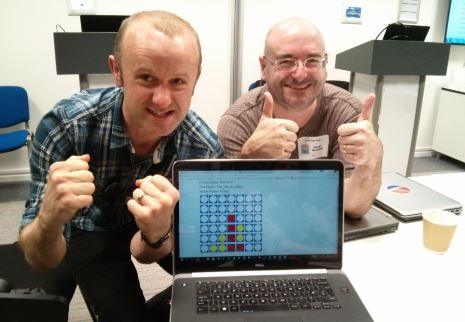
Connect 4 - Wednesday 7th December 2016
In December, David Betteridge ran a fun bot-building session which had people creating a program to play Connect 4.
Templates were provided in several languages to connect to the HTTP based server, although a few poeple ended up writing their own. David told us about a couple of advanced methods we could try (Minimax and Monte Carlo) - a couple of teams had a go at Monte Carlo. We played a couple of the bots off against each other which was good fun - in the end the fairly simple bot of Adam P and Geoff won out against the more advanced implementations. Although there was some suggestion that the Monte Carlo algorithm that always played in column 0 might have had some issues..
The template and server code, as well as some solutions, are up on github.
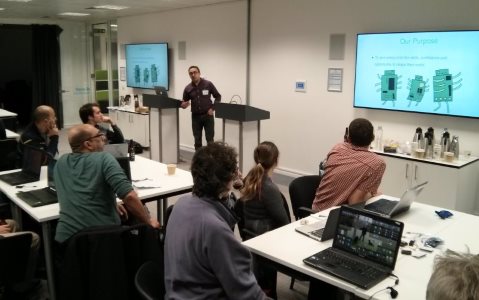
Intro to Code Club - Wednesday 5th October 2016
This month, LCD regular and organizer of the Kotlin Yorkshire Meetup Group Andy Bowes ran a session based on another of his programming interests, Code Club.
In his words:
Code Club is a nationwide network of volunteers who provide afterschool coding clubs for children aged between 9 & 11. In this month's Code Dojo we will find out more about Code Club and get a chance to go back to school & try some of the projects that teach coding. The projects will use Scratch to create games and will also provide an opportunity to program the new BBC micro:bit, a computer that can fit into the palm of your hand.
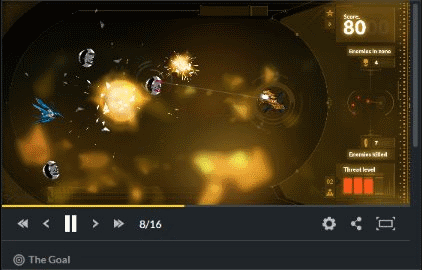
Coding Problems: CodinGame - Wednesday 7th September 2016
Following on from our previous Coding Problems sessions (Euler and Rosalind), with their more traditional format, this time we looked at one of the new wave of programming problem sites. Instead of coding algorithms to calculate the answers to set problems, CodingGame sees you implementing bots and AI which participate in dynamic games, in real-time, with some nice visualisations to go with them.
It was an interesting session - most people did the tutorial exercise then went onto one of the more difficult problems, and later on most of the group got involved in some multiplayer coding challenges, which were a lot of fun. CodinGame - it's the future!
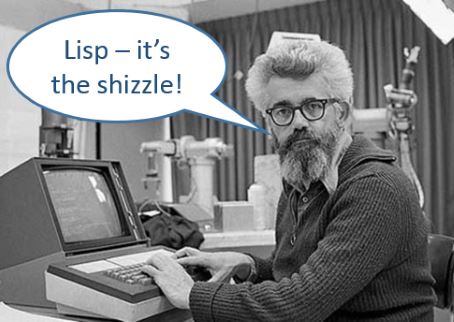
Try a Language: Scheme - Wednesday 3rd August 2016
This month we had a go at Scheme, a kind of Lisp, introduced in 1975 but still popular as a teaching language and the basis of some modern languages including Clojure and Racket.
Twenty-two people turned up to listen to a brief history and introduction to Lisp and Scheme, before working through some exercises designed to teach the language from scratch. It took a while to get used to the parentheses, but by the end everyone was getting into it, cons'ing, car'ing and cdr'ing their way through recursive lists like champs!
The slides and exercises, as well as some solutions, are up on github.
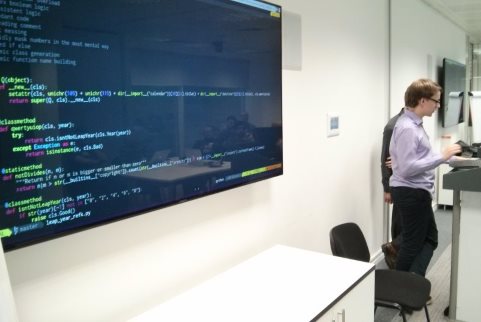
Birthday Refuctoring - Wednesday 1st June 2016
In this session, the group coded up a well-structured Leap Year Algorithm before refuctoring the bejesus out of it in the funniest, cleverest ways they could imagine!
It was a good turnout, with 20-odd coders abusing a variety of languages including Python, C#, Java and Scheme.
Go and have a look at some of the solutions on github - if you dare!
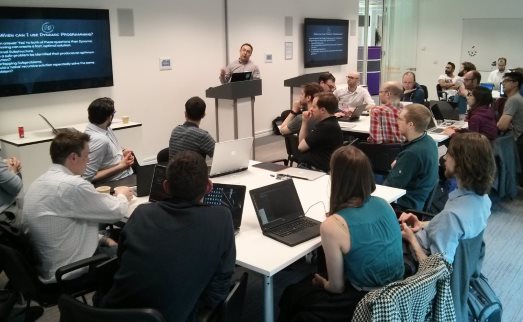
Dynamic Programming Kata - Wednesday 4th May 2016
This month, Regular LCD'er, Bioinformatics problem-solver and Google Code competitor Andy Bowes gave us the low-down on the Dymanic Programming technique which he has put to good use in some of his problem solving.
After a brief introduction by Andy featuring some nice examples, we worked in pairs to put the tequnique to work solving problems including the Coin Change problem and the Optimum Path problem.
Despite the fairly advanced nature of the tequnique, with Andy's help pretty much everyone got a working solution to the first problem, with one pair almost finishing three. Languages used included Kotlin, F#, JavaScript, Scheme, Haskell and C++.
You can find the slides, problems and solutions on github.
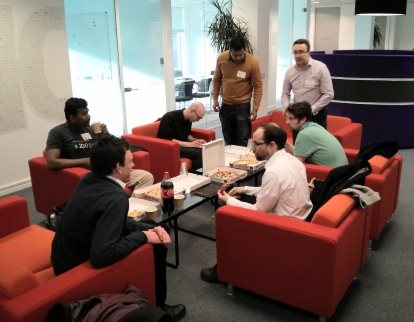
Return of the TDD Kata - Wednesday 6th April 2016
For April's session we returned to our roots with a good old TDD Kata, whereby we worked on a problem using Test Driven Development and Pair Programming. The problem we used was based on Numbers in Words, which involves converting an integer to it's written English equivalent. (Or French equivalent, as one particularly fearless pair attempted!)
Despite bad weather there was a fair turnout, and a few new people turned up which is always good. Languages used were Kotlin, C#, Ruby, JavaScript, Scheme and Haskell.
The solutions from the night can be found on github.
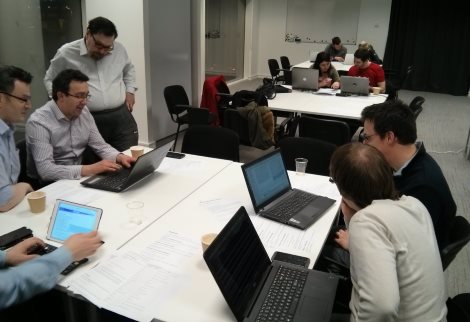
Try a Language: APL - Wednesday 2nd March 2016
This month we moved away from your fancy modern languages, and took a trip back to a simpler time when the only data type was the multidimensional array and you had to enter programs using a special keyboard. Did I say simpler time? Let's just say a different time..
Although APL is quite different to what most of us code in nowadays, many languages have similar roots, although the main reason for giving it a try is to open your mind to the possibilities that different kinds of programming present. Also, when you can write a program to find prime numbers in 17 characters, it's killer for code golf! (In case you're wondering, '(~R∊R∘.×R)/R←1↓ιR').
Regular LCD'er Darren Drapkin explained the language history and basics to us, then we went through some 'getting started' exercises before trying to tackle a couple of the Project Euler exercises. While these are fairly suitable for APL, being optimised for maths-based algorithms, getting into the APL midset was quite challenging in the time we had. Even so, most of the group managed to get through at least one of the problems, which I'm counting as a success!
The documentation and exercises are on github.
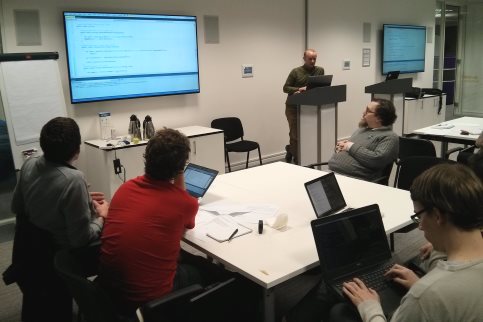
Google Jammin' - Wednesday 3rd February 2016
With the 2016 edition of Google's popular coding contest Google Code Jam opening in March, we had a look at the setup of the contest and had a go at a couple of problems from previous years.
Despite the last-minute announcement, there was a fair turnout, with solutions in the usual languages - C#, F#, Elixir, Python, and C++.
Some of the solutions are up on github.
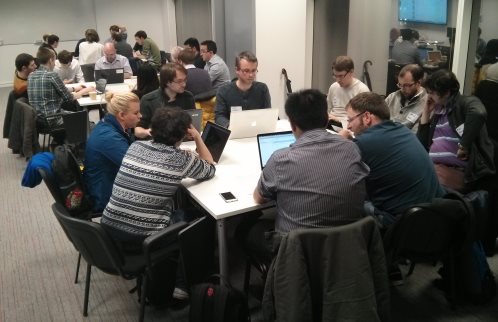
Coding Problems: Rosalind - Wednesday 6th January 2016
To kick off 2016, we had a look at another set of online coding problems, this time in the form of Rosalind. This site, named after Rosalind Franklin, is dedicated to bioinformatics-based problems. Similar to Project Euler, the problems start off easy and get progressivly harder, and with the badges and achievements can prove similarly addictive!
Most people got a few problems solved, and there was a good mix of languages including F#, Java, Haskell, Python, C#, JavasScript, C, C++ and Ruby! There was even some functional Java, which apparently is no longer an oxymoron.
Some of the solutions are up on github.
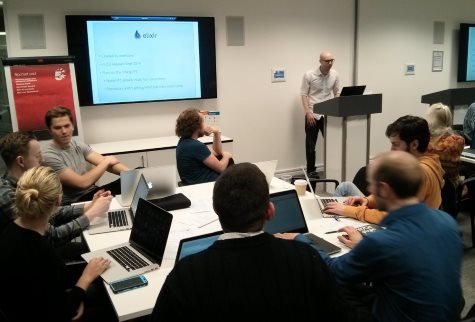
Try a Language: Elixir - Wednesday 2nd December 2015
In the second of our 'try a language' series, Phil Helliwell showed us around another functional language, this time in the form of Elixir.
According to the website, "Elixir is a dynamic, functional language designed for building scalable and maintainable applications. Elixir leverages the Erlang VM, known for running low-latency, distributed and fault-tolerant systems."
Phil gave us a brief overview, after which we worked through a set of exercises he designed, culminating in the creation of a text-based Multi User Dungeon. It was a very well put-together dojo, helping beginners with a gentle introduction while having the scope for more advanced coders to get really stuck in, while showing off the good bits of the language.
I'm not sure if it was Phil, Elixir or just a general growing interest, but we had another record turnout with 25-odd coders, which is great to see. Hopefully the trend will continue next year!
Phil's slides and exercises, and some of the solutions, are up on github.
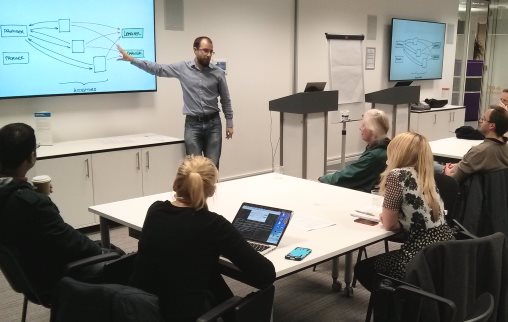
The Paxos Participation - Wednesday 4th November 2015
In this session, David Turner put together the challenge of a team-based implementation of the Paxos algorithm, a protocol for solving consensus in a network of unreliable processors.
There were three types of actor to implement - proposers, acceptors and learners - with coders working in pairs to implement each. Dave had created a server which worked using basic HTTP requests, as well as skeletons in a variety of languages - we had solutions in Ruby, F#, C#, Haskell and Python.
Some of the solutions, as well as Dave's examples, skeletons and server code can be found on github.
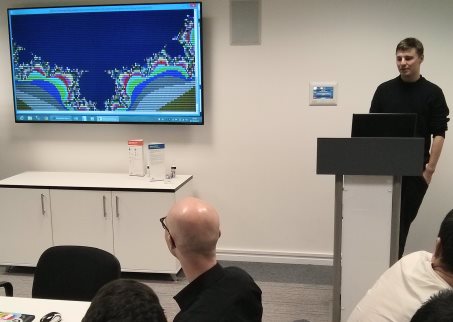
ASCII Fractals - Wednesday 7th October 2015
This month, David Betteridge guided us through the process of creating fractal images based on the Mandelbrot Set, displaying them using that format so close to the programmer - ASCII characters.
It was a great turnout, and there were solutions created in Scheme, Haskell, C#, Ruby and Python. Everyone managed to get the basics up, and some even got their implemenations zooming, panning and rotating around the image!
The code is almost as beautiful as the fractals themselves... Check it out on github!
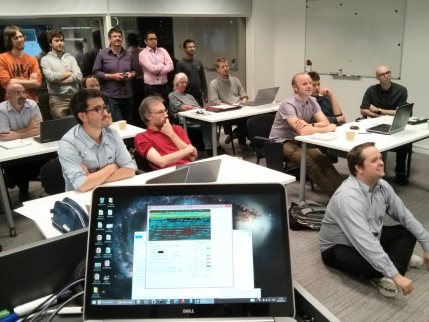
Core Wars - Wednesday 2nd September 2015
We took a dive down to the lowest of levels this month, using assembly language to code up warriors to compete in a Core War!
Another capacity turnout came to take part, with no previous knowledge of the Redcode assembly language used, yet all teams managed to get a working bot together to compete in the big tournament.
Strategies ranged from simple Imps all the way to an ambitious Vampire, with final victory going to Gordon and Geoff's Black Knight, a self-replicating Bomber.
Never has a group of people had so much fun watching a block of memory!
The bots, along with links and documentation, are on github.
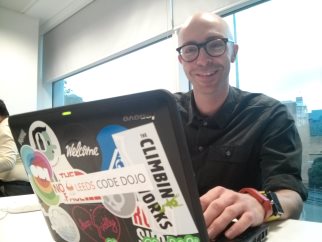
Make it Run, Make it Right - Wednesday 5th August 2015
This time we went back to TDD, specifically the different strategies available in the 'make it run, make it right' phase as described by Kent Beck in TDD by Example. (For more details, check out my blog post about it.)
The problem we tacked was implementing a Simple Prefix Calculator, which seemed to provide a good level of challenge for everyone.
It was another record turnout at LCD with over 20 people participating, which was great to see! As expected a number of languages were being used including C#, Python, JavaScript, Haskell and Ruby. Astonishingly, there was no F# or Scheme in sight!
As usual, the solutions can be found on github.
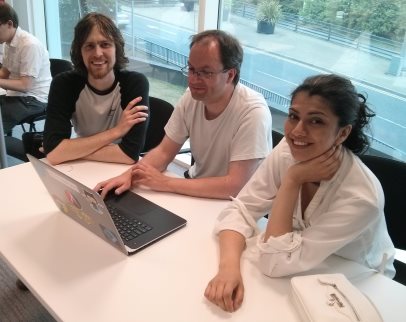
Birthday Golf - Wednesday 1st July 2015
To celebrate our first year of existence, we returned to one of the most fun sessions from the previous year, Code Golf, where the objective is to code a solution in the smallest possible number of characters.
We did two problems, namely printing out the lyrics to 'Happy Birthday Leeds Code Dojo' as a warm-up, then a slightly more involved one involving calculating the length of a Collatz sequence.
There were a variety of languages including C, Haskell, R, JavaScript, Ruby, Python, C# and GolfScript (with some teams even switching languages for the second problem). There were some truly ingenious solutions, with perhaps the best (although in something of a grey area rules-wise) involving using the unary number scheme to get down to 44 bytes!
The solutions are on github, with the slides on Prezi.
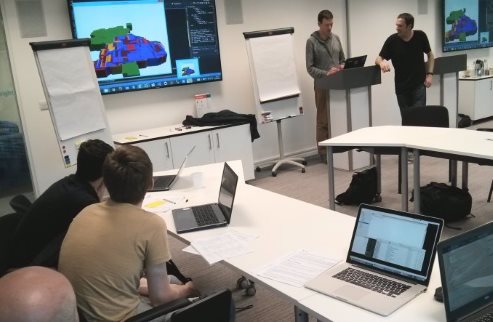
Try a Language: F# - Wednesday 3rd June 2015
In a variation on our normal format, in this session we all put down our usual programming tools of choice and had a go at F#, .Net's functional language.
I gave an overview of the language and Chris Dobson put together some interesting exercises based on creating 3D objects, which certainly helped make learning fun!
There was a good turnout of 20-odd people, and most seemed to enjoy the it, so we might do more 'try a language' sessions in the future. If you'd like to come and guide us through your favourite language, get in touch!
The slides and exercises, as well as some people's solutions, are on github.
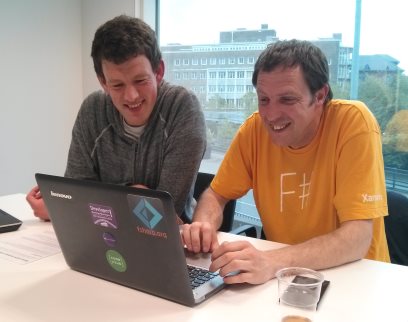
Take it to the Bank - Wednesday 6th May 2015
This month, we had a go at the Bank OCR Kata, closely based on the oringinal problem from codingdojo.org.
It was a fairly difficult problem with four distinct sections, but many pairs managed to get the first three finished. It was also a challange to tackle with TDD, because it was often difficult to identify and take small steps - but a good learning experience. At least one coder finished off part 4 afterwards!
There were solutions in Elixir, F#, Java, Haskell, Python and C#. Some of them can be found on github.
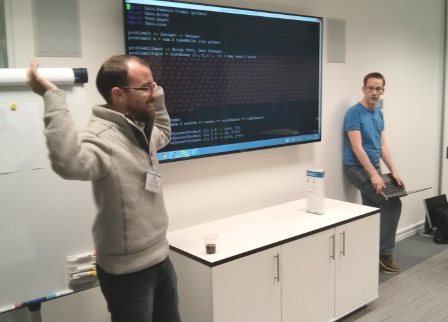
Coding Problems: Project Euler - Wednesday 1st April 2015
There are many ways to get better at coding, but a sure bet is to have a go at some coding problems. And as collections of coding problems go, they don't get much more classic than Project Euler!
Project Euler is a website which contains several hundred maths-oriented programming problems, arranged roughly from easiest to hardest. It takes it's name from Leonhard Euler
In April's session, we had a go at some of the problems using Java, F#, Haskell, Scheme and more. There was head scratching, there was googling, there were all sorts of ways to generate prime numbers, but most importantly there was fun!
Go and check out the solutions on github to see the results.
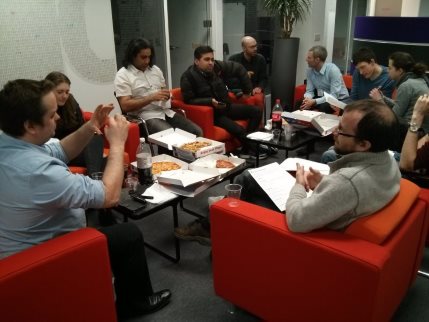
Recursion: See Recursion - Wednesday 4th March 2015
In this session, we had a crack at writing some recursive algorithms, commonly used in functional programming but also a good fit for many typical problems.
There were a variety of exercises for different levels of familiarity with recursion, from summing a list of numbers through to tail-call-optimised continuation-based mind-benders!
The group got on well, with everyone getting the hang of the basics of recursion and several pairs doing the more advanced exercises.
The slides are on prezi, and the solutions are up on github, as usual.
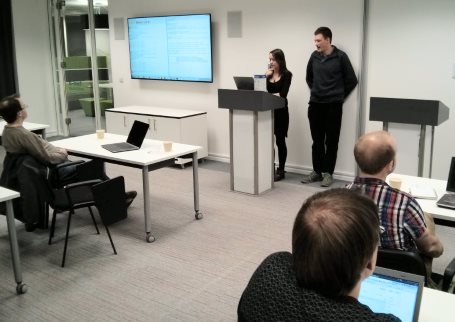
Checkout Kata - The Redoux! - Wednesday 4th February 2015
For our second session of 2015, we had another go at the Checkout Kata. Since most of the group had done it before, this gave people a chance to try something different - an alternative approach to the problem, a new language, a different coding partner, and so on.
There was a great mix of languages, including a Leeds Code Dojo first appearance for Elixir and Go, with Scala, F#, Haskell and C# also on show.
Some interesting solutions got coded up, and Adam and Matt even managed to get the extended requirements working with their Scala implementation.
Go and check out the solutions on github.
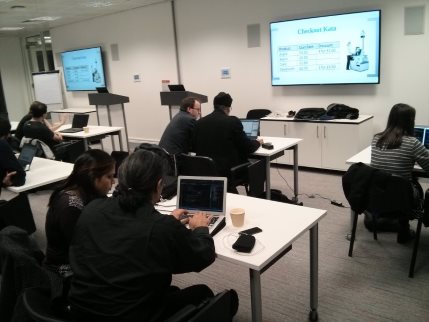
Checkout Kata - Wednesday 7th January 2015
To kick 2015 off, we had a go at the Checkout Kata, a classic TDD problem with a variety of possible implementations.
It was our best turnout so far with 20 people, and as usual we had a good variety of languages present - JavaScript, F#, Haskell, Lisp, Java, and C# - and quite a few people tried something new.
There were a good variety of solutions implemented, with the discounts being calculated using pure maths, arrays of functions, pattern matching, objects, and more. Variety, as they say, is the spice of life!
The github repo from the night has a few of the solutions, why not take a look!
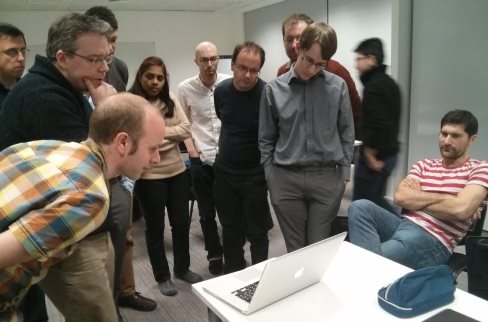
Refuctoring - Wednesday 3rd December 2014
In this session, the group enjoyed coding up a nice, clean solution to FizzBuzz before mercilessly refuctoring it into an unrecognisable pile of tangled ASCII! (Or in some cases, Unicode..)
The solutions started out in Java, C#, F# and Haskell, but by the end could barely have been recognised as such by the language designers themselves. There were many devious crimes against programming such as code which would only work one day of the month, source written in a variety of Unicode symbols, y-combinator abominations and plain old bad naming.
We learned a few things about programming, and more importantly, had a lot of fun.
Go and have a look at some of the solutions on github - if you dare!
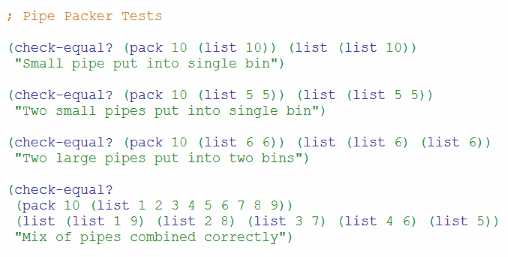
The Pipe Packing Challenge - Thursday 6th November 2014
In a coding session that took inspiration from the last leeds sharp session, five pairs of us wrote algorithms to try and solve a simplified version of the bin packing problem.
There were once again many languages in effect - Erlang, F#, C# and Haskell - and all of the pairs had a working solution by the end. Most ended up with a 'First Fit' algorithm, which does a pretty good job of finding a solution to this NP-Hard problem without taking the age of the universe to run..
Most of the solutions are up on github - go check them out!
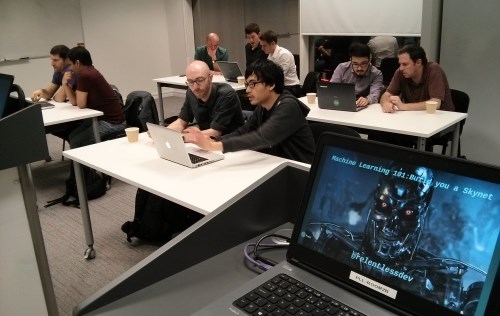
Build you a Skynet - Wednesday 1st October 2014
We worked in twos and threes to write Machine Learning algorithms based on the k-nearest neighbours algorithm. The group did well, with almost everyone getting a working solution, and some teams getting to over 90% accuracy with their digit classification!
There were several languages in use - F#, Objective C, Scala, C#, and Python, and again a few people got involved with a new language, well done to them.
Have a look at some of the solutions on github.

Word Wrap Kata - Wednesday 3rd September 2014
We paired up to tackle another problem using TDD and Pair Programming, this time looking at implementing a Word Wrap algorithm. This takes a line of text and wraps it to a certain length - similar to how Notepad and other text editors work.
As usual, there were several languages in use - C#, Python, and PHP, with a couple of folk trying out something new. We also tried out the 'test list' technique, where you maintain a list of tests throughout the session, crossing them off and adding more as you go.
The problem proved fairly interesting, with a few different techniques emerging - recursion seemed to work well and produce fairly simple solutions, and some people chose to return collections of strings with others going for a block of text. The initial choice of test (and therefore implementation path) seemed to have quite a bit impact on how easy it was to get to a working solution.
Go and see the solutions on github
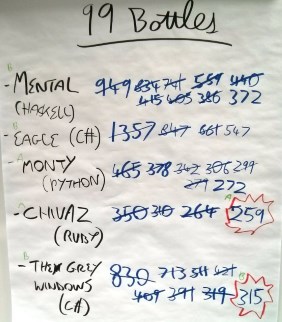
Fore! A nice round of Code Golf: Tuesday 5th August 2014
We had a great round of code golf, with several languages represented - C#, Ruby, Python and Haskell. We coded up solutions to output the '99 bottles' song, then made them as small as possible!
As you might predict, the Ruby and Python solutions were initially much smaller at 400-odd characters, but it was quite a struggle to get them down to the ultimate winner at 257 characters. The C# and Haskell solutions on the other hand started out much larger at 1000-plus chars, but ended up only 50 or so characters behind the scripting languages. It was an exciting race to the finish line!
A couple of the solutions are up on github - go and be impressed!

The Dojo Opens: Wednesday 9th July 2014
The first Leeds Code Dojo went really well – 17 people joined in, from a variety of different backgrounds and of various skill levels, so a great response. The Callcredit boardroom was pretty much at capacity, we might need to get a bigger room for the next one!
We worked in pairs on the ‘Kata Potter’ programming problem, practising the skills of TDD and Pair Programming. It was great to see a number of languages being used, including C#, F#, Ruby, Python, and PHP, with a few people trying out a new language for the first time.
Several of the solutions are up on github - go check them out!

